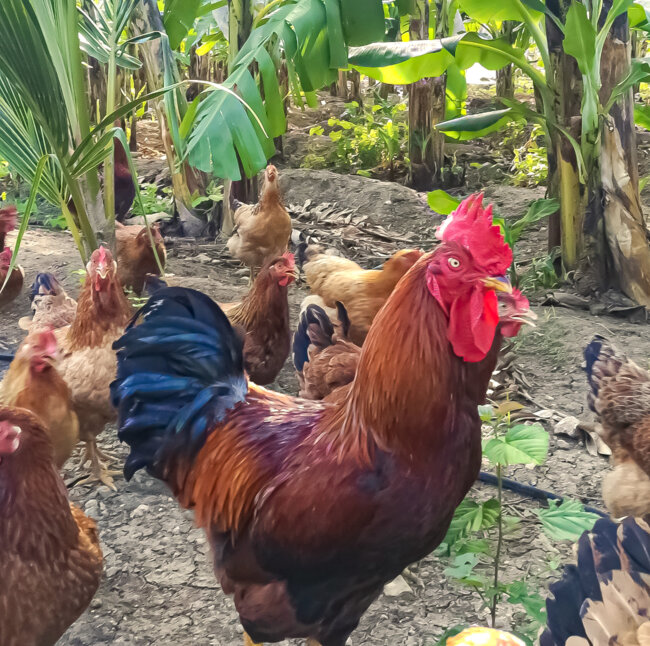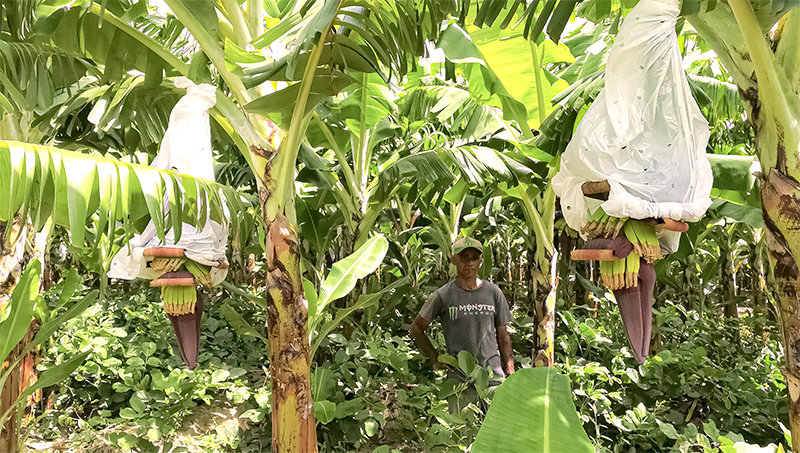We reproduce below an article that originally appeared in the May 2021 edition of Pesticide News, by Gustavo Gandini of BANELINO, which represents 336 Small-scale organic Fairtrade banana producers in the Dominican Republic.
The Pesticide Action Network UK recently collaborated with the UN Food & Agricultural Organisation (FAO) and policy makers in the Caribbean region on ways to reduce and phase out Highly Hazardous Pesticides. Regional expert, Gustavo Gandini from the Dominican Republic, talks here about the agroecological approach to weed management developed over two decades with organic banana producers:
Firstly I should say that the word ‘weed’ does not exist in organic language! Calling them ‘herbs’ instead leads to a different way of managing them and generating added value. We use the following methods to keep these plants at manageable levels within organic banana systems.
- Biodiverse cropping models, with at least three species (cocoa, coconut, soursop, moringa and non- competitive ground cover) reduce sunlight, create competition and supply organic matter for mulch.
- Planting banana at higher density, combined with rational management of nitrogen, helps shade out unwanted species.
- Bananas produce large quantities of organic matter that generate a mulch cover which is renewed weekly.
- Use of ground cover plants, either leaving species to grow naturally but keeping them at a height of no more than 15-20 cm, or planting so called ‘service plants’, usually legumes, e.g. Canavalia, Mucuna bean, to cover the soil. Farmers report that with cover plants they can reduce their manual weeding costs by 80%, needing only to keep plants off the young banana stems.
- Use of weed killing inputs permitted in organic systems. Some producers have found using high concentration soap has a herbicidal effect. Using undiluted biofermentation products on herb foliage exerts a burning effect, as well as providing soil nutrients after the dead material is incorporated as organic matter.
- Grazing animals in the banana crop to feed on vegetation. Chickens can be allowed to graze from early morning until afternoon. We use up to 30 hens per hectare, which only occasionally require monitoring. Alternatively, a maximum of 2 goats or sheep per hectare can graze, as long as there is some herby vegetation present, otherwise they may browse the young banana suckers.
- Considering all these herbs as raw material for composting encourages farmers to cut, collect and process them and then apply them as a nutritive source, with economic benefits and more self-sufficient farm input management.

Running chickens to graze amongst bananas as a form of weed management. Credit: Gustavo Gandini
Many agroecological techniques are mutually supportive. For example, by not applying chemical contact or systemic fungicides to manage Sigatoka disease, organic banana farmers benefit from more biodiverse decomposer soil microorganisms, recycling organic matter more efficiently and maintaining a stable mulch cover. In contrast, soils under conventional systems are poor in beneficial fungi and tend to rapidly decline in organic matter. What would help spread agroecological approaches to more farmers are studies to validate and quantify the benefits.
Image below: Ground cover plants between banana rows substantially reduce need for manual weeding. Credit: Gustavo Gandini
